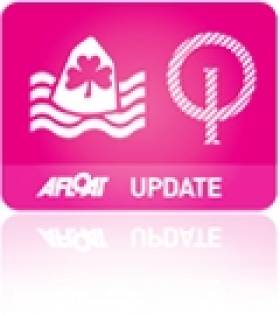Displaying items by tag: clinic
Rave Reviews for RYA Northern Ireland’s Regional Training Day and Windsurfing Clinic
More than 60 sailors, instructors and centre principals from across Northern Ireland gathered at Strangford Lough Yacht Club and Newtownards Sailing Club for a recent weekend of RYANI training.
The training day and windsurfing clinic allowed for all participants to develop their skills and learn about new RYA schemes. Ahead of what promises to be a busy season, it was an ideal way for members to learn how develop sailing and boating at their club.
Speaking on the training day at Strangford Lough lasyt Saturday (23 March), Bryan Monson from East Down Yacht Club said: “It was great day brushing up skills and meeting some other power boat instructors.”
Sunday (24 March) saw windsurfing and wing instructors running a clinic in Newtownards, including a chance for attendees to get out on the water and brush up on teaching skills, especially coaching on self-development.
Among the “hugely positive” feedback, Richard Robinson from County Antrim Yacht Club said: “It was a great day and a great chance to discuss some of the challenges to the development of wind and windsurfing and winging in NI.”
Optimist Class Seek New Talent in Baltimore
#optimist – Impressed with the sailing success of 14-year-old Sophie Browne in New Zealand this week? Could you be the next to represent Ireland on the world stage? The Irish Optimist class is making every effort to bring on as many 'Oppy' sailors as possible with an Invitation to all Optimist sailors to its 2012 Spring Training Week in Baltimore from 13-17 February 2011, the school half-term.
IODAI, the International Optimist Dinghy Association of Ireland, organises a Spring training week every year which is open to all Optimist sailors in Ireland.
Baltimore in West Cork sits near the very southern tip of Ireland on the beautiful southwest coast roughly mid-way between the busy tourist destination of Dingle and Kinsale. Slightly off the tourist trail, Baltimore has restrained a village atmosphere, but it still has plenty of top class accommodation and a great place to eat and drink.
The village of Baltimore will be taken over by approximately 150 sailors and their families for the week of February mid-term. Coaches have not yet been announced, but typically are a mix of the top Irish and international coaches; in 2011, the Irish coaches were joined by coaches from Denmark, Spain and Italy.
Training will be provided daily for sailors of all competencies, from those who have never sailed before – pre-Regatta fleet level - to those who are competing internationally.
The class particularly would like to encourage sailors who have not attended an event outside their own club in the past, to consider coming to Baltimore, which is a non-competitive, fun week intended to build enthusiasm for sailing and to allow sailors from around the country to get to know each other.
The Baltimore event is considered to be one of the top International clinics in Europe.
It is very much a family-oriented event, with a programme of activities for children too young to sail, and events also organised for adults, such as the 'How to Rig an Oppi' class for novice parents!
The event is organised by IODAI which is comprised of volunteers, mainly parents of sailors, who organise the Optimist events calendar. Because everyone is a volunteer, Baltimore is an 'all hands on deck' week, with parents encouraged to lend a hand with the work that goes into making it such a special event. Helping out with making sailors lunches, doing slip duty, rescue on the water, or safety checking of boats, means that parents will get to know each other just as well as the sailors do.
Evening activities are also on offer, including the ever-popular 'Pizza night with the Coaches', tours of the Baltimore castle and RNLI station, and cinema night. And of course the cake competition on the last day of sailing.
An IODAI forum takes place during the Baltimore week where all parents are invited to express their views or seek information on the running of the Optimist class.
Entry is open to all interested sailors and entry can be made through the online Sailracer system, or directly by contacting the organiser Aidan Staunton at [email protected].
Baltimore has accommodation to suit our Sailors with a wide selection of Holiday homes, Apartments, Bed & Breakfast and Casey Hotel. Families can choose somewhere near the harbour or centre of the town. Accommodation can be booked on www.baltimore.ie where you will find a comprehensive list of accommodation.





























































